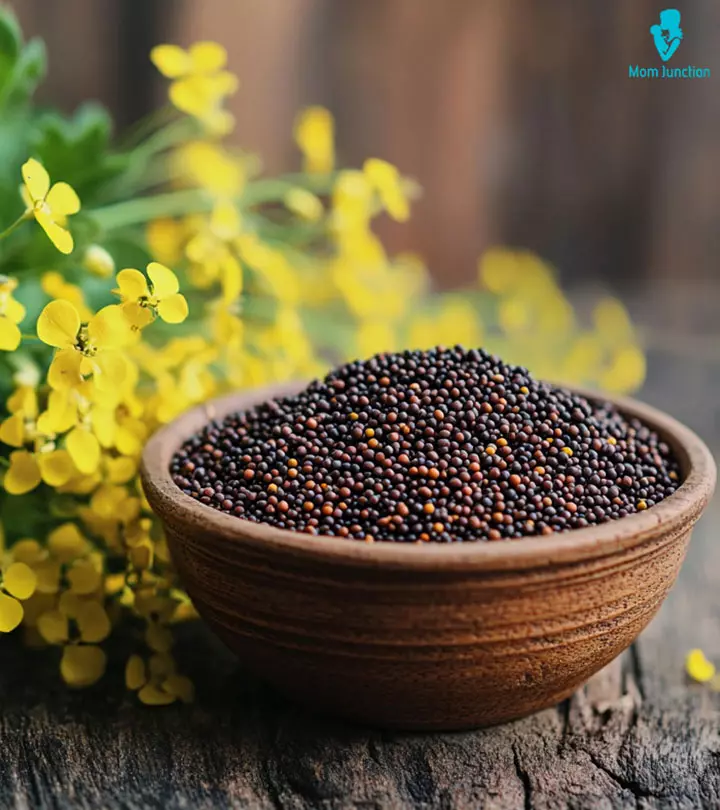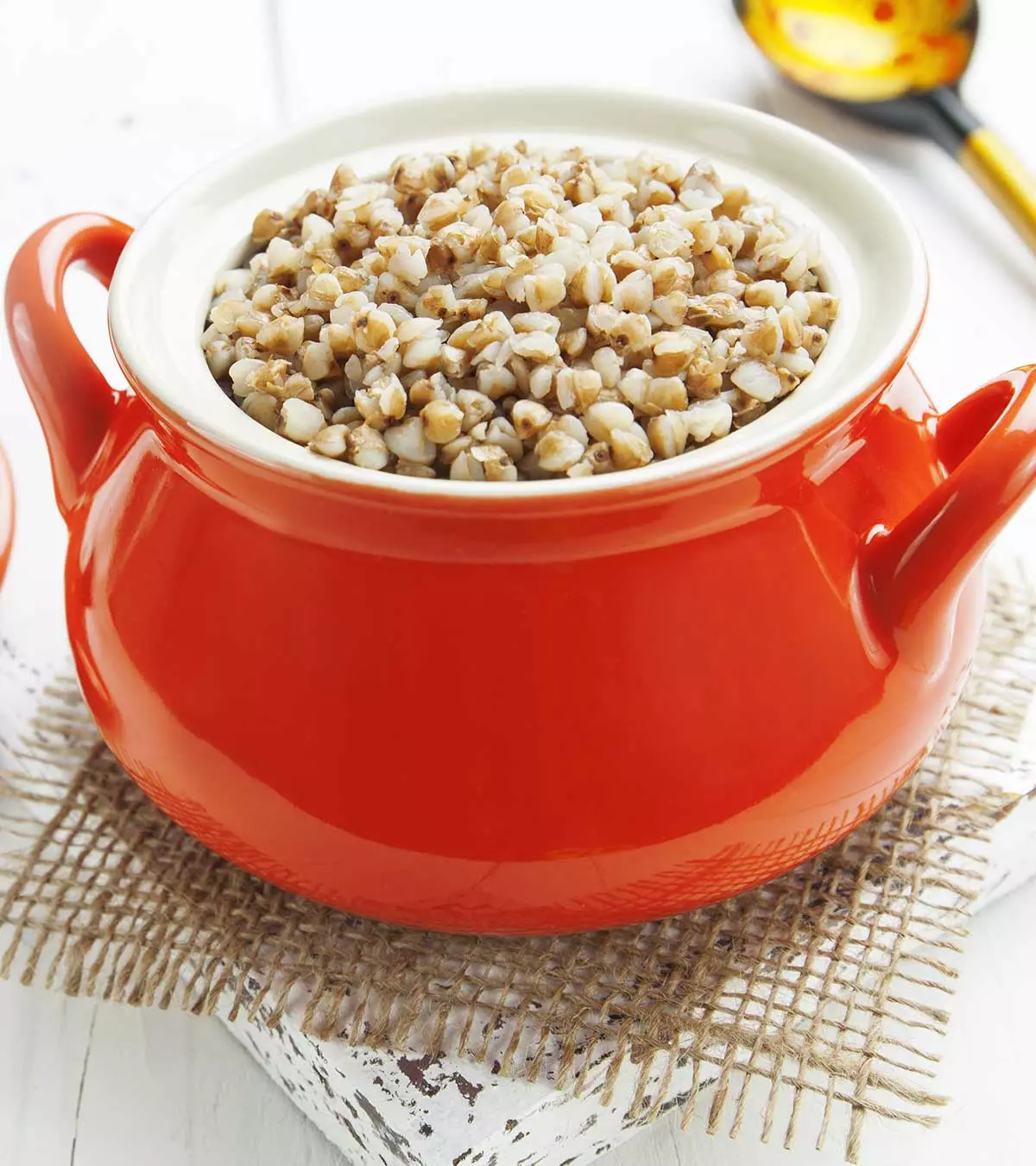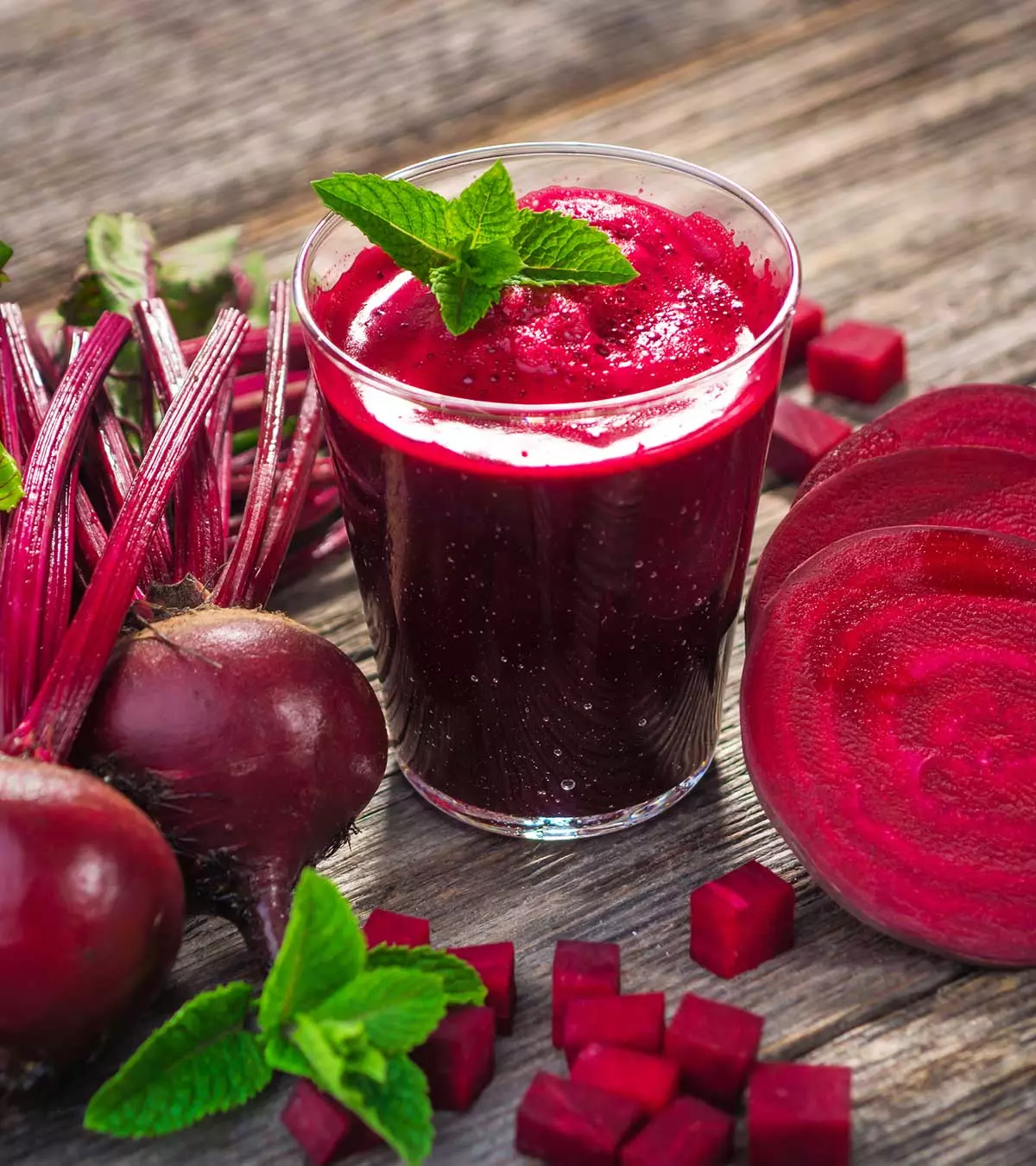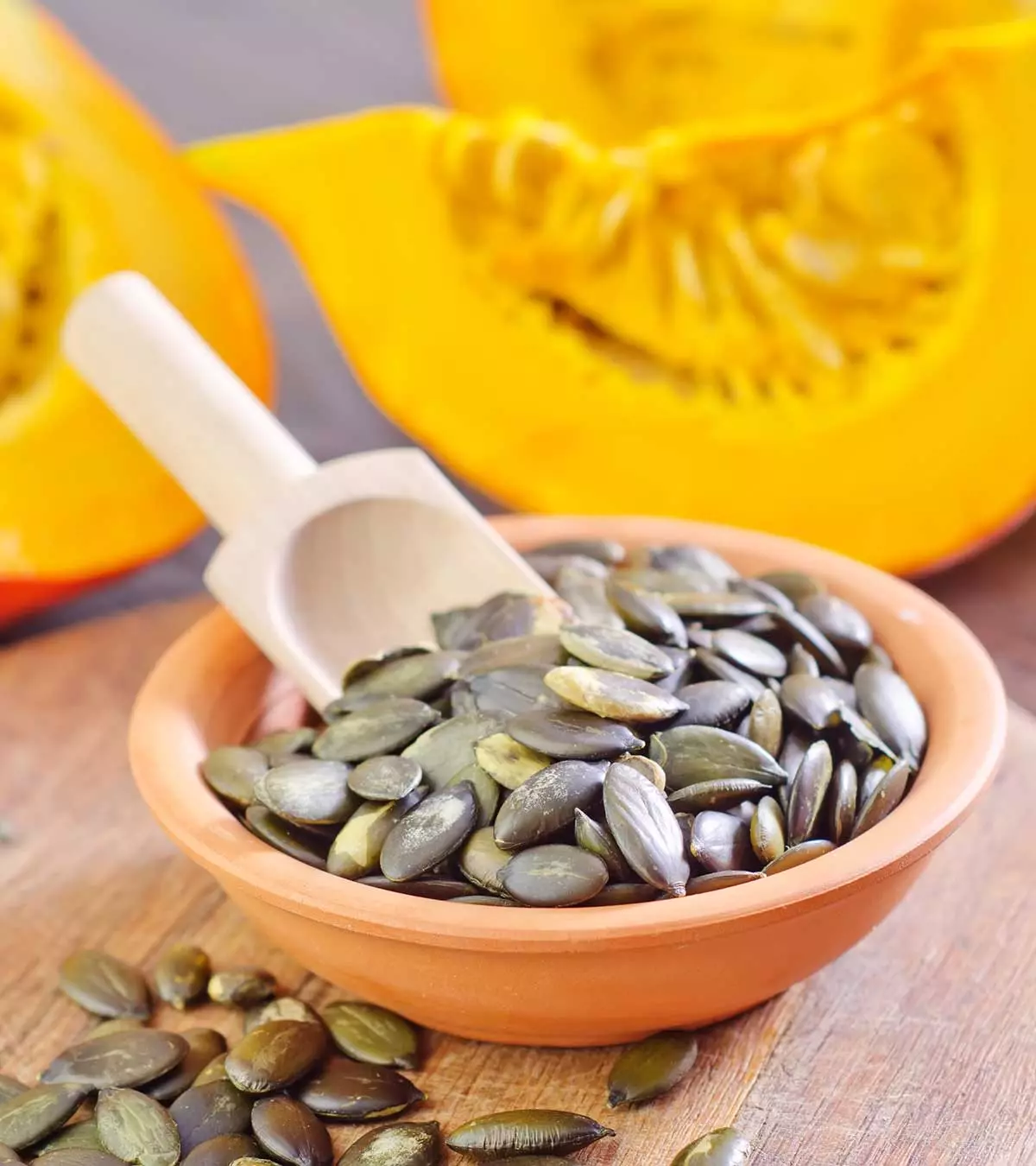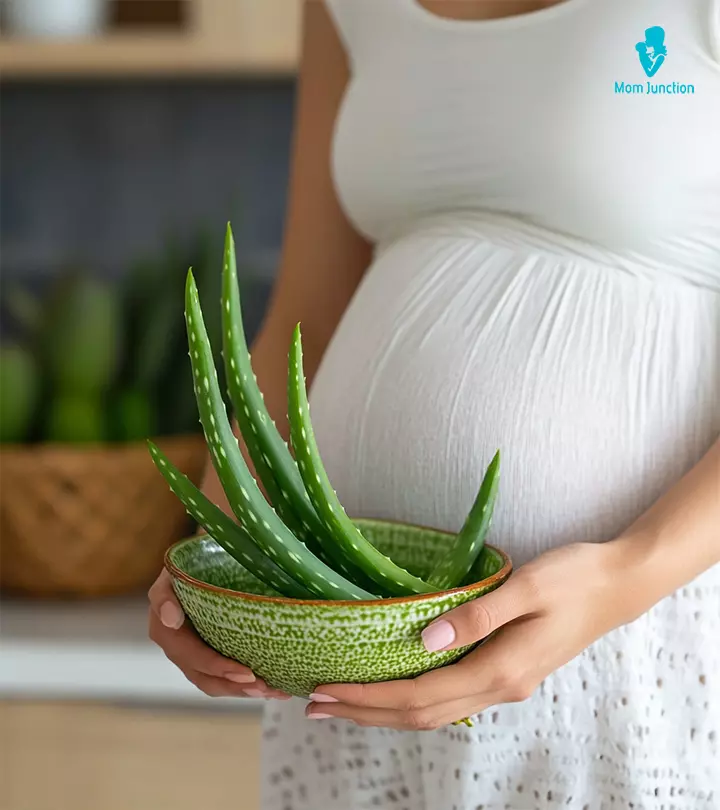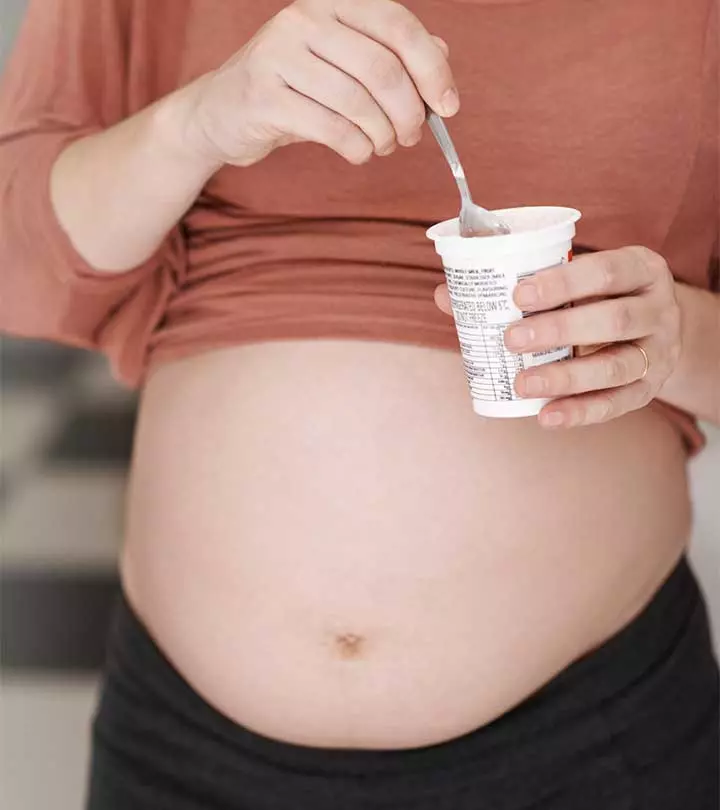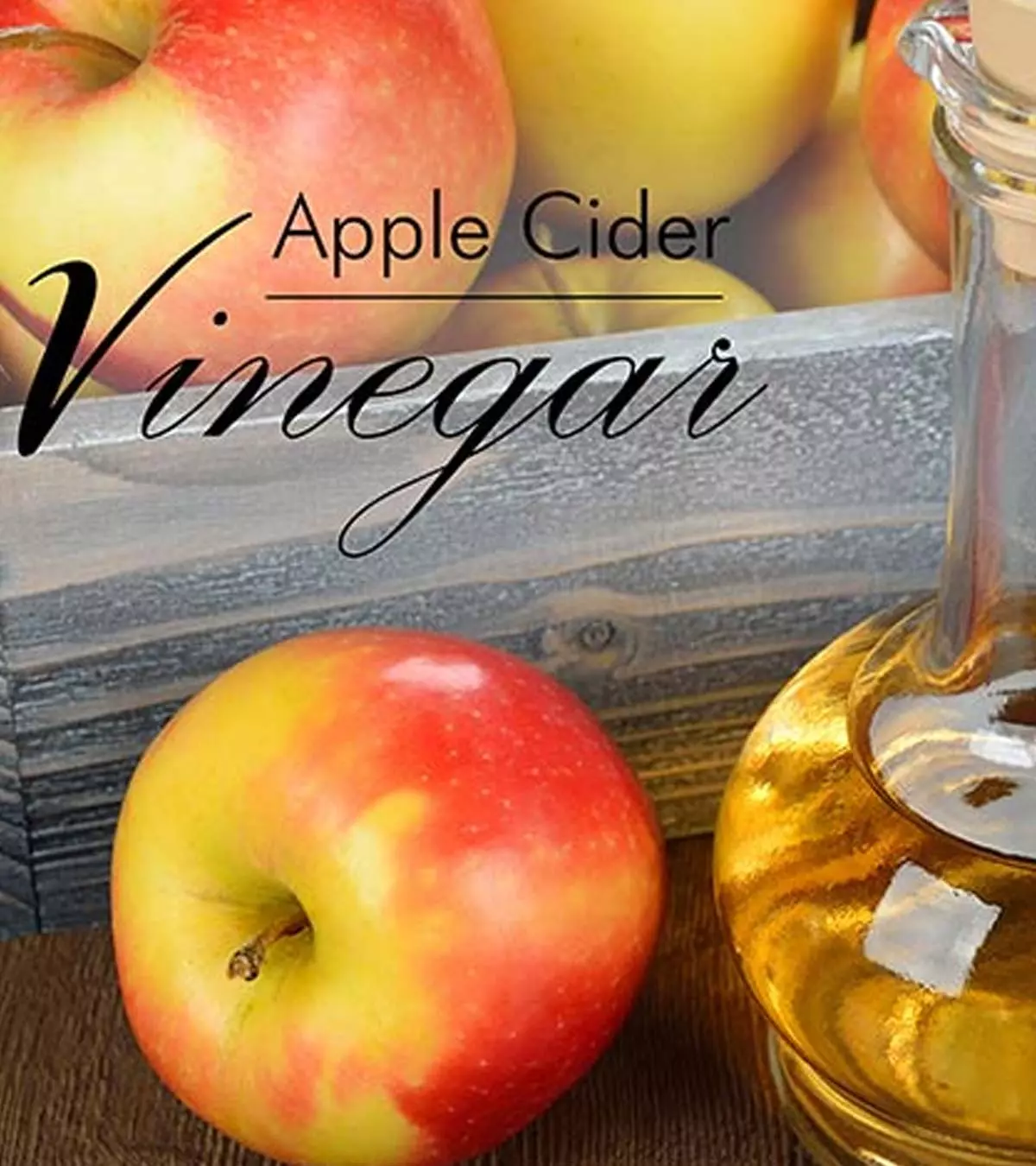
Image: ShutterStock
Apple cider vinegar is the vinegar that is made from fermented apple juice. Is it safe to have apple cider vinegar during pregnancy? We will help you answer this question in this post. Apple cider vinegar is commonly available in two forms: pasteurized and unpasteurized. Pregnant women are advised to consume the pasteurized form of apple cider vinegar as it is free from any harmful bacteria or microorganisms. However, there is a risk that consuming apple cider vinegar might cause heartburn. Therefore, it is advised to consult your doctor before consuming it and also to stop if you feel any discomfort to ensure safe prenatal care (1). Read on to know more about the benefits and adverse effects of having apple cider vinegar and its recommended usage for pregnant women.

Key Pointers
- Pasteurized ACV in small amounts is safe to consume during pregnancy.
- ACV has various benefits, including fighting morning sickness, infections, acidity, acne, diabetes, and digestive issues.
- Some pregnant women may experience adverse reactions, such as irritation of the bowel and throat, from consuming ACV.
- ACV should be avoided by pregnant women with gastric problems or those taking certain medications.
- Unpasteurized ACV should not be consumed during pregnancy as it may increase the risk of stillbirth or miscarriage.
What Is Apple Cider Vinegar?
Apple cider vinegar is a product made from crushed apples through a process of fermentation. It contains folic acid or folate, pectin, biotin, and vitamins, including vitamins B1, B2, B6, and C. It is initially turned into alcohol and then to acetic acid. The final fermented apple cider vinegar (ACV) is sold in two forms (1):
- Pasteurized form – removes potentially harmful bacteria such as E.coli
- Unpasteurized form – believed to be healthy with its components intact
| Pasteurized ACV | Unpasteurized ACV |
|---|---|
| Refined and clear version of apple vinegar | Raw and unfiltered organic version of apple vinegar |
| Does not contain mother substance, which contains nutrients | Contains mother substance |
| Clear liquid | Murky liquid |
| Safe for pregnant women as harmful bacteria are cleared off | Should consult your doctor before consuming it |
Can You Drink Apple Cider Vinegar While Pregnant?

Yes! Studies suggest that during pregnancy you can drink pasteurized apple cider vinegar as it does not contain any harmful bacteria. ACV has health benefits when taken in small amounts along with other foods (2).
Dominique Andreoli, a functional nutritionist from Dudley, Massachusetts, says, “The amount of apple cider vinegar considered safe during pregnancy is not well established. Generally, it is recommended to limit its consumption to small amounts, such as those used in cooking or dressings. Drinking excessive amounts of apple cider vinegar can lead to unwanted side effects such as heartburn and low potassium levels, which may harm the mother and the developing fetus.”
Moreover, there is no sufficient research-based evidence to establish the safety of ACV for expecting mothers (3). Also, remember that ACV should not be given to infants at all as the product is acidic.
Let us go in depth into apple cider vinegar benefits during pregnancy.
Benefits of Apple Cider Vinegar while Pregnant
Dr. DeForest Clinton Jarvis, author of ‘Folk Medicine’, recommended apple cider vinegar for pregnant women (4). According to him, drinking apple cider vinegar while pregnant has multiple benefits:
1. Provide relief from morning sickness
According to experts at the Wake Forest School of Medicine, 80 of all pregnant women experience nausea and vomiting. ACV is pH neutral and helps settle the stomach acids that cause nausea. It, therefore, provides relief from the terrible feeling of morning sickness during the first trimester (5).
Mix two tablespoons of ACV in a cup of warm water and have it early in the morning.
2. Combats yeast infections
Apple cider vinegar contains distinctive components, which can control and cure yeast infections such as candida infections. Topical application of ACV can reduce the infection and its symptoms. You can dilute it and apply it on the infected skin or use it in a hot water bath. Internal consumption strengthens the immune system and prevents diabetes, both of which can slow down the infection from healing.
Mix two tablespoons of ACV in a cup of warm water and drink it twice a day until the infection disappears (6).
3. Helps manage urinary tract infections (UTI)
Cloudy urine during pregnancy can be an underlying symptom of urinary tract infections. ACV contains enzymes and useful minerals that slow down the growth of UTI-causing bacteria. According to UT Southwestern Medical Center, around 7% of expectant mothers may experience asymptomatic UTIs during pregnancy (22).
Have two teaspoons of ACV in a glass full of water, twice a day. You can also use a little ACV in bath water to avoid infections (7).
4. Prevents acidity and heartburn
Heartburn can occur during the second trimester when the stomach contents move back to the esophagus and cause an irritation (acid reflux). It is due to the pressure exerted by the growing baby on the digestive tract. ACV neutralizes the acidic food and provides relief.
Consume one tablespoon ACV mixed in water to prevent heartburn (8).
5. Clears stuffy nose and offers sound sleep
The potassium content and anti-inflammatory property of ACV thins the mucus and reduces sinuses swelling.
Mix two tablespoons of ACV with one tablespoon of honey in a cup of warm water, and have it twice or thrice a day (9).
6. Helps manage acne

Hormonal changes during pregnancy often lead to acne and other skin problems such as warts. Raw apple cider vinegar will act as a toner and it can rebalance the pH of the skin, remove dead cells, and excess oils.
To make this antibacterial and antiseptic toner, mix ACV and distilled water in 1:3 ratio and apply to the skin using a cotton ball (9).
7. Normalizes blood pressure levels
The acetic acid present in ACV lowers the blood pressure by reducing the activity of rennin enzyme, which increases blood pressure.
Combine three tablespoons of ACV in a glass of warm water or any beverage of your choice (except sugary sodas) and drink it for a week (10).
8. Regulates blood flow
You will have swollen hands, feet, and varicose veinsiSwollen, enlarged, and twisted veins that commonly occur in hands and feet due to poor blood circulation. ACV eases the blood flow, thereby relieving these conditions.
Mix ACV with any regular lotion and use on the affected parts. You can also make a homemade cream by mixing half a glass of ACV, half carrot, and three tablespoons of aloe vera gel. For internal consumption, take two to three tablespoons of ACV in a cup of warm water along with honey (optional) (11).
9. Detoxifies your body
Apple cider vinegar has a detoxifying effect on your body (14). A cleansed body system absorbs the nutrients better, which in turn leads to better metabolism.
10. Treats diabetes
ACV reduces blood sugar levels and insulin sensitivities when taken with some foods.
According to Lisa Richards, nutritionist and founder of Candida Diet, “Individuals with type 2 diabetes have seen benefits from using apple cider vinegar to control their blood glucose. It works by reducing insulin sensitivity when a high-carb meal is consumed, and if taken before bed, it can improve fasting blood glucose numbers in the morning.”
However, you should always consult your doctor before adding ACV to your diet, especially when you are on medication for diabetes (12).
11. Aids in digestion
The antibiotic properties of ACV could help fight stomach problems and indigestion caused by harmful bacteria. It improves digestion by regulating metabolism and promoting good bacteria in the stomach.
ACV also contains pectin, which soothes an uneasy tummy (13).
12. Promotes weight loss

Consuming apple cider vinegar before meals makes you feel full and therefore helps you eat less. Thus, it might help to curb pregnancy-related cravings. However, you should have a nutritional and well-balanced diet to nourish yourself and your baby (14). Therefore, consult your healthcare practitioner if you can take ACV with your diet.
13. Provides relief from cold
Apple cider vinegar’s antibacterial properties fight the cold and sore throat symptoms (15).
Add one tablespoon of ACV in a glass of warm water and drink twice a day until the symptoms subside. You may also put the mixture in a vaporizer and leave it overnight in your room.
14. Helps manage leg cramps
You may not sleep well due to leg cramps caused by low potassium levels and pressure on the circulatory system. ACV contains excellent levels of potassium that relieves the discomfort (16).
 Quick fact
Quick factDespite its benefits, pregnant women need to consult a doctor before incorporating ACV into their diet since the health conditions and dietary needs of every pregnant woman may vary. If you are convinced and want to buy ACV, then choose the best quality product.
Jo Chan, a mother of two and a prenatal yoga instructor, says, “I’ve been using apple cider vinegar to help with some sinus issues that popped up during pregnancy, and I must say, it’s pretty darn good! Cleared up my stuffy nose and flu really well (i).”
Tips To Buy Best Quality Apple Cider Vinegar

To pick the best quality ACV:
- Read the ingredients and make sure the ACV is made of crushed apples or cider.
- Check for pale amber color
- Heinz and Bragg are the most trusted brands.
Apple Cider Vinegar Supplements During Pregnancy
ACV mixed with water is safe to consume and provides many benefits. However, you should avoid taking ACV supplements when pregnant. Most supplements (available in the form of capsules and pills) do not contain apple cider vinegar. Plus, some of them may not contain the actual mother product.
Alerting about the potential pitfalls of using ACV pills, Melissa Wdowik, an assistant professor at Colorado State University, states, “These supplements are not regulated, so you cannot know what or how much you are getting, and there is evidence that some do not even contain vinegar (16).”
Supplements can be risky during pregnancy, especially if raw apple cider vinegar is the ingredient. Therefore, avoiding these supplements or taking your practitioner’s opinion is better.
ACV may not always be safe for the mother-to-be and could be accompanied by some nasty problems.
Side Effects Of Having Apple Cider Vinegar When Pregnant
Unpasteurized apple cider vinegar is considered unsafe and may lead to certain risks.
Andreoli opines, “Drinking unpasteurized apple cider during pregnancy can be risky as it may contain harmful bacteria such as E. coli and Salmonella, which may cause food poisoning. These bacteria may adversely affect the mother and the developing fetus, leading to complications such as miscarriage or stillbirth.”
Even if you’re taking pasteurized ACV, be careful of certain risks. Some of the risks associated with ACV are:
- If you are taking certain medications, such as diuretics and insulin, then do not have ACV as it could lower the potassium levels, and be unsafe for you and your baby. Check with your doctor before you begin taking ACV (17) (16).
- ACV is highly acidic and can erode your tooth enamel when you consume it directly (17).
- In some cases, ACV gives you irritation in the stomach and throat, leading to digestive upset and throat problems (16).
- According to experts, ACV might increase the acidity of the body, which would put pressure on kidneys and bones (16).
- It may also lower your blood sugar level if taken with herbs like aloe and bitter melon (3).
As ACV is acidic, you should not have it in high quantities. Also, you need to take care while consuming it.
 Point to consider
Point to considerHow To Consume ACV Safely?

- Do not ingest ACV directly as it harms your enamel, affects the esophagus, and can cause more problems. Always dilute ACV before consuming.
- If you are keen on choosing the ACV dietary supplements, then check the ingredients and constitution of the product before buying.
- Minimize exposure of your teeth to vinegar by using a straw to have fluids that contain ACV.
- Rinse your mouth after drinking anything that contains ACV.
- Avoid ACV when you have any stomach problems. Also, make sure to take ACV with or after meals, and not on an empty stomach.
- Beware of allergies. If you feel any discomfort when you take ACV, see your doctor immediately.
ACV could be quite unpleasant to consume because of its acidity. But there are ways to make it taste better.
 Quick tip
Quick tipHow To Store Apple Cider Vinegar?
ACV has a low pH, which makes it self-preserving to some extent. Here are some simple tips on how you can store it:
- Do not store ACV in a metal container or bottle, as it can corrode the metal. Instead, keep the ACV in a glass or plastic container.
- Store ACV in a dark bottle in a dry, cool place away from direct sunlight or heat, as they can degrade vinegar’s quality over time.
- Always keep the bottle tightly closed, as exposure to air can cause oxidation, which may alter vinegar’s taste and composition.
- Refrigerating ACV is not necessary. However, storing ACV in a cold place is suitable as it can slow down potential bacterial growth and maintain the vinegar’s quality.
Refrigeration might cause the vinegar to form sediment. However, shaking the bottle before use is harmless and can be resolved.
How To Make ACV Taste Better?
You may not always feel like having apple cider vinegar with water as it tastes bitter. There are some tasty and safe ways to include ACV in your diet during pregnancy:
- Add one teaspoon of ACV and two teaspoons of honey to a glass full of water. Add two tablespoons of ACV and two teaspoons of raw honey to one and a half cup of fresh grapefruit juice.
- Add two tablespoons of apple or grape juice, two tablespoons ACV, half teaspoon cinnamon powder, and half teaspoon stevia to one-and-a-half cup of cold water and have the ACV elixir.
Note:
Do not drink these as water but have them in small sips. Limit these drinks to two or three times a day. Also, consult your health practitioner before taking any of them.
Frequently Asked Questions
1. Can apple cider vinegar help with constipation during pregnancy?
Some anecdotal evidence suggests that apple cider vinegar may help alleviate constipation. Organic acids present in ACV may improve digestion (18). Drinking hot apple cider vinegar may relieve constipation (19). However, there is limited scientific research on the effectiveness of ACV for constipation during pregnancy.
2. Can apple cider vinegar help with stretch marks during pregnancy?
As per a study, topical application of apple vinegar effectively reduces the size of striae (20). While some sources suggest that ACV may help reduce the appearance of stretch marks, more research is needed to confirm its effectiveness.
3. Can apple cider vinegar help with anemia during pregnancy?
Consumption and use of ACV may be beneficial in treating hematological problems and anemia. Its use could positively impact the prevention of hemolytic anemiaiA blood disorder where the red blood cells in the body break down faster than the body can replace them induced by phenylhydrazine due to the antioxidant properties of its major components (21). However, you will need iron supplementation to manage anemia, and you must consult a doctor for it.
4. Can I take apple cider vinegar gummies while pregnant?
California-based dietitian and nutritionist Vandana Sheth suggests, “While gummies may seem safer, it’s still good to be cautious since the FDA does not typically regulate them, and their impact on pregnancy is not well-researched. It’s always best to consult your healthcare team before adding supplements to your pregnancy diet.”
5. What are the alternative options or supplements for pregnant women that can provide similar benefits as apple cider vinegar?
ACV can sometimes put pregnant women at risk; therefore, it is better to look for safer alternatives to ACV, especially for pregnant women. High in antioxidants and vitamin C, Lemon water is one of the best alternatives for ACV for pregnant women. It helps digestion, curbs nausea, and promotes weight loss (23). Ginger tea, Kombucha (fermented tea), coconut vinegar, and yogurt are safer alternatives for ACV (24).
Consuming pasteurized apple cider vinegar during pregnancy is considered safe. ACV has several benefits and helps deal with various pregnancy symptoms such as morning sickness, acidity, and heartburn. However, it is advised that you buy the best quality ACV from the market after thoroughly checking the ingredients and manufacturing dates. In addition, you could mix ACV with a glass of water and honey to reduce the acidic taste and make its consumption easier. If you have any doubts about the safety of consuming it or its potential effects on fetal development, consult your doctor.
Infographic: Tips To Consume Apple Cider Vinegar Safely During Pregnancy
A bit tangy in taste, apple cider vinegar (ACV) is a beverage made from apple fermentation. It is popularly used as a natural remedy, for cooking purposes, and even as a cleaning agent. However, if you’re thinking about consuming them during pregnancy, look through the infographic below to learn some helpful advice on consuming ACV safely.
Some thing wrong with infographic shortcode. please verify shortcode syntax
Illustration: Is It Safe To Have Apple Cider Vinegar During Pregnancy?
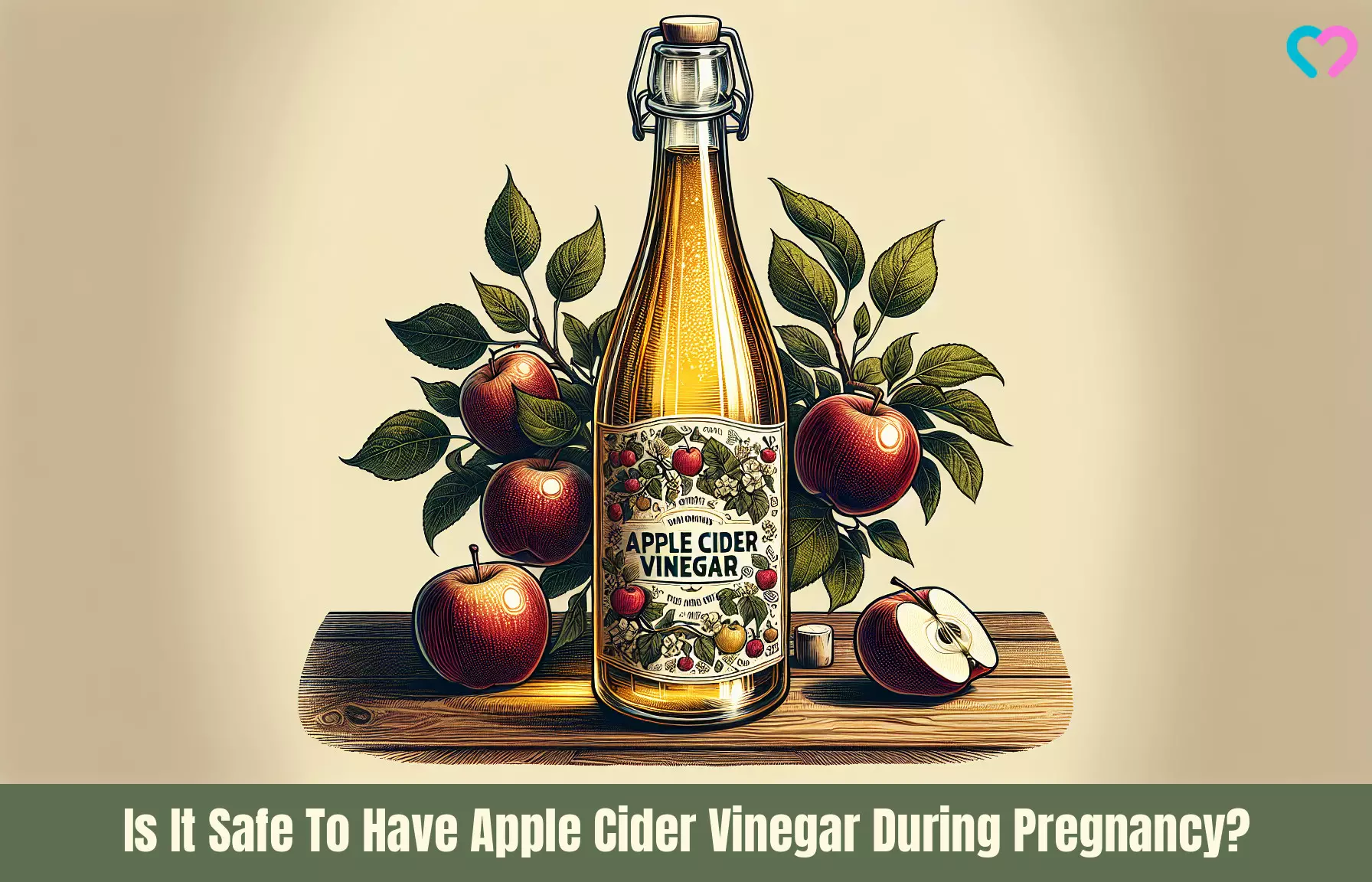
Image: Dall·E/MomJunction Design Team
Personal Experience: Source
MomJunction articles include first-hand experiences to provide you with better insights through real-life narratives. Here are the sources of personal accounts referenced in this article.
i. Apple cider vinegar: natural remedy for pregnancy symptoms;https://mysuryayogababy.blogspot.com/2013/11/apple-cider-vinegar-natural-remedy-for.html
References
- Carol S. Johnston and Cindy A. Gaas; (2006); Vinegar: Medicinal Uses and Antiglycemic Effect.
https://www.ncbi.nlm.nih.gov/pmc/articles/PMC1785201/ - Food Safety by Type of Food.
https://www.foodsafety.gov/keep-food-safe/food-safety-by-type-food - Apple Cider Vinegar
https://medlineplus.gov/druginfo/natural/816.html - Mack Lipkin; (1984); Suggestion and Healing
https://muse.jhu.edu/article/403706/summary - Emily E Bunce; Robert P. Heine; (2025); Nausea and Vomiting During Early Pregnancy
https://www.msdmanuals.com/professional/gynecology-and-obstetrics/symptoms-during-pregnancy/nausea-and-vomiting-during-early-pregnancy - Ana Carolina Loureiro Gama Mota et al.; (2015); Antifungal Activity of Apple Cider Vinegar on Candida Species Involved in Denture Stomatitis.
https://pubmed.ncbi.nlm.nih.gov/25219289/ - Peter Grandics; (2003); Cancer: a single disease with a multitude of manifestions?.
https://www.ncbi.nlm.nih.gov/pmc/articles/PMC305362/ - Home Remedies For Heartburn.
https://www.franciscanhealth.org/community/blog/home-remedies-for-heartburn - Apple cider vinegar boosts health.
https://students.com.miami.edu/reporting/apple-cider-vinegar-offers-health-benefits/ - S Kondo et al; (2001); Antihypertensive effects of acetic acid and vinegar on spontaneously hypertensive rats.
https://pubmed.ncbi.nlm.nih.gov/11826965/ - Derya Atik et al.; (2016); The Effect of External Apple Vinegar Application on Varicosity Symptoms Pain and Social Appearance Anxiety: A Randomized Controlled Trial.
https://www.ncbi.nlm.nih.gov/pmc/articles/PMC4735895/ - Carol S Johnston, Cindy A Gaas; (2006); Vinegar: Medicinal Uses and Antiglycemic Effect
https://pmc.ncbi.nlm.nih.gov/articles/PMC1785201/ - Tingting Jiang, et al.(2016); Apple-Derived Pectin Modulates Gut Microbiota, Improves Gut Barrier Function, and Attenuates Metabolic Endotoxemia in Rats with Diet-Induced Obesity
https://pubmed.ncbi.nlm.nih.gov/26938554/ - Apple cider vinegar diet: Does it really work?
https://www.health.harvard.edu/blog/apple-cider-vinegar-diet-does-it-really-work-2018042513703 - What Apple Cider Vinegar Can (and Can’t) Do for You
https://health.clevelandclinic.org/exploring-the-health-benefits-of-apple-cider-vinegar - Nutrition News – Beware apple cider vinegar claims
https://extension.colostate.edu/topic-areas/nutrition-food-safety-health/nutrition-news/nutrition-news-beware-apple-cider-vinegar-claims/ - Raw Apple Cider Vinegar- The Elixir Of Life.
https://tagteam.harvard.edu/hub_feeds/2406/feed_items/1602742 - Akanksha Singh & Mishra Sunita; (2017); Study About The Nutritional And Medicinal Properties Of Apple Cider Vinegar.
https://www.researchgate.net/publication/322953260_STUDY_ABOUT_THE_NUTRITIONAL_AND_MEDICINAL_PROPERTIES_OF_APPLE_CIDER_VINEGAR_ARTICLE_INFO_ABSTRACT - 8 Home Remedies for Constipation.
https://health.clevelandclinic.org/home-remedies-for-constipation - Maryam Eshghizadeh Et Al.; (2018); The Effect Of Topical Application Of Apple Vinegar On Striae Gravidarum: A Randomized Clinical Trial.
https://journals.innovareacademics.in/index.php/ajpcr/article/view/25592 - Driss Ousaaid et al.; (2025); Anti-Anemic Effect of Antioxidant-Rich Apple Vinegar against Phenylhydrazine-Induced Hemolytic Anemia in Rats
https://www.ncbi.nlm.nih.gov/pmc/articles/PMC8880287/ - UTIs during pregnancy are common and treatable.
https://utswmed.org/medblog/utis-during-pregnancy/ - Is Starting Your Day With Lemon Water Healthy?
https://health.clevelandclinic.org/benefits-of-lemon-water - From ACV to Zest: 10 Creative Apple Cider Vinegar Substitutes You’ll Love.
https://wp.nyu.edu/discovers/2025/02/22/from-acv-to-zest-10-creative-apple-cider-vinegar-substitutes-youll-love/
Community Experiences
Join the conversation and become a part of our nurturing community! Share your stories, experiences, and insights to connect with fellow parents.
Read full bio of Jyoti Benjamin
- Vandana Sheth is a registered dietitian nutritionist, certified diabetes care and education specialist, certified intuitive eating counselor, and CEO of a nutrition and wellness coaching business. She has authored the book My Indian Table: Quick & Tasty Vegetarian Recipes.
 Vandana Sheth is a registered dietitian nutritionist, certified diabetes care and education specialist, certified intuitive eating counselor, and CEO of a nutrition and wellness coaching business. She has authored the book My Indian Table: Quick & Tasty Vegetarian Recipes.
Vandana Sheth is a registered dietitian nutritionist, certified diabetes care and education specialist, certified intuitive eating counselor, and CEO of a nutrition and wellness coaching business. She has authored the book My Indian Table: Quick & Tasty Vegetarian Recipes. - Lisa Richards is a certified nutritionist coach from the Institute for Integrative Nutrition. She is an author at the Candida Diet (thecandidadiet.com), with 17 years of experience.
 Lisa Richards is a certified nutritionist coach from the Institute for Integrative Nutrition. She is an author at the Candida Diet (thecandidadiet.com), with 17 years of experience.
Lisa Richards is a certified nutritionist coach from the Institute for Integrative Nutrition. She is an author at the Candida Diet (thecandidadiet.com), with 17 years of experience.
Read full bio of Rebecca Malachi
Read full bio of Swati Patwal
Read full bio of Dr. Joyani Das








